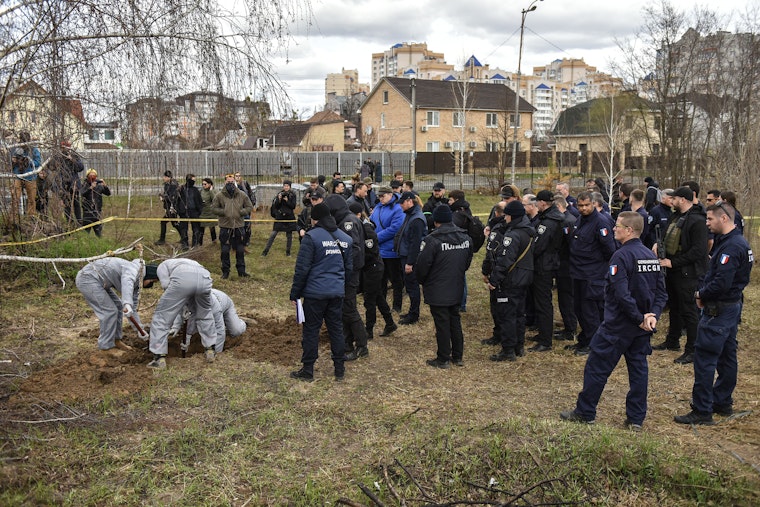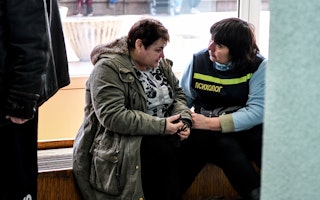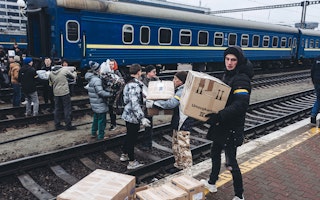Building War Crimes Cases in Ukraine
By Roman Romanov

The images emerging from Bucha shock the conscience. The dead bodies of Ukrainian civilians, dropped by bullets outside their homes, many with their hands behind their backs, are a horrific sight. The world has clamored for investigation and justice, as evidence of war crimes against the Ukrainian people comes plainly into public view.
The situation is terrible. It is also not new. I come from Sevastopol, in Crimea, which Russian soldiers invaded in 2014. So the story of occupation is personal for me. Over the past eight years, the International Criminal Court has been examining evidence of extrajudicial killings and disappearances, torture, political persecutions, as well as other crimes and gross human rights violations. They will now be adding evidence of thousands of new atrocities to their docket. The wheels of international justice turn slowly. And victory is not assured.
As horrifying as the current state of affairs in Ukraine is, there is much that will help prosecutors develop their cases. Atrocities sometimes take years to uncover in international conflicts. Witnesses can be hard to find, fearful of coming forward and speaking out against their aggressors. Documenting who was responsible can be challenging.
But in Bucha and other communities only now reckoning with the terrible toll of an assault that is ongoing, we see stark evidence—on cell phone video, social media, and satellite feeds. The international attention to Russia’s invasion since it began in February helps provide real-time intelligence about the movement and actions of President Putin’s forces. And the Ukrainian military has been gathering valuable phone records, other sources provide aerial footage of an assault in Bucha that left civilians dead in its wake.
Ukrainian civil society groups as well as investigative authorities are hard at work, building the body of evidence. I support them, through my work as director of the Human Rights and Justice Program at the International Renaissance Foundation in Ukraine, where I have served for almost 20 years now. I have been aiding the work of documentation of Russian aggression since the occupation of Crimea in 2014.
My colleagues and I were awakened on the morning of February 24 at 5 a.m., jolted upright by the sound of Russian missiles strafing Kyiv. I immediately headed to our offices, to make sure data on our work and our grantees could be securely transferred to a safer location in western Ukraine, so that the servers could not be captured or compromised by Russian forces should they occupy Kyiv. I then returned home and began moving my family to Lviv, the sound of Russian jets overhead providing a menacing soundtrack to our relocation effort.
From here the work of documenting grave crimes and pursuing accountability continues. We support our grantees’ efforts to share the evidence they collect with national investigative authorities, and to submit dozens of communications about what has occurred to the office of the prosecutor at the International Criminal Court. The court has conducted earlier a preliminary investigation with a report based heavily on information submitted by Ukrainian civil society groups.
But collecting and preserving the evidence is just one step on the climb toward justice. We need to make sure we have the proper mechanisms to address the evidence and hold perpetrators accountable—not only the military personnel on the front lines, but the commanders who ordered their actions, and the political leadership of the country, who are ultimately responsible for the war.
Putin’s declaration at the outset of the hostilities that Ukraine does not exist sent a message to the Russian military: you can abuse, kill, rape, and torture. We are seeing the consequences of that edict in places like Bucha and will see much more horror in the days to come, as Russian troops withdraw from more Ukrainian territory.
Perhaps the biggest hurdle we face is that there is no international jurisdiction to practically address the crime of aggression if it is committed by a UN Security Council permanent member. Furthermore, Russia will decline to cooperate with the International Criminal Court over its war crimes investigations. The UN Security Council can meet and condemn what’s happening, but the perpetrator sits on the council and maintains veto power, greatly constraining that body’s ability to hold Russia to account. As President Zelensky said in his speech to the Security Council last week, if its members cannot stop Russia’s aggression or provide meaningful paths to justice, “admit there is nothing you can do besides conversation.”
In March, the Council of Europe—the continent’s leading institution upholding the rule of law and human rights—suspended Russia’s rights of representation. Later, the UN General Assembly suspended Russia from being a part of the UN Human Rights Council. To create consequences for the crime of aggression, we should consider creation of a specialized court or tribunal either universal, endorsed by the UN, or regional based on agreement with the Council of Europe or the EU. This should be a priority for the nations of Europe and the world if true accountability is ever to be achieved.
These are real challenges on the road to justice. But they should not stop us from our determined effort to hold Russia accountable for its violent deeds. We can support the Ukrainian investigative authorities and help conduct forensic examinations of the type of weaponry Russian soldiers used against civilians. We can work with prosecutors, putting forth the strongest evidence to help shape the strategies they pursue, as they will be deluged with thousands of possible cases, and encourage collaboration among detectives, prosecutors, and judges across the region. We can help build capacity. We can share knowledge and expertise.
We are at the very beginning of a long journey. But I am encouraged by the show of will from so many allies across Europe and around the world. In 2014, there was very little international attention to Russia’s conduct as it took Crimea. Many countries and companies looked the other way, eager to preserve business as usual. Today, the world is watching, and is mobilizing every day to demand an end to the hostilities and consequences for Russia’s grotesque actions. This energy gives me hope that we may finally find a way to establish meaningful mechanisms to investigate and ensure accountability for the grave crimes now unfolding in Ukraine.
More from Open Society on Ukraine:
Roman Romanov is director of the Human Rights and Justice Program at the International Renaissance Foundation in Ukraine.

